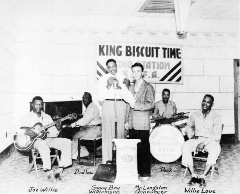The Arkansas State Archives hosted its annual fall symposium on September 27. This year’s event focused on the diverse musical heritage of The Natural State. Entitled Tunes & Tales: A Celebration of Arkansas Music, the symposium was held at the historic Mosaic Templars Cultural Center in Little Rock.
The day started with a presentation by Dr. Brooks Blevins, who focused on Arkansas' ties to the Grand Ole Opry's inception. Blevins, an author and regional historian, discussed a book written by the creator of the Grand Ole Opry, George D. Hay. In his book, A Story of The Grand Ole Opry, Hay reminisced about a trip to Mammoth Spring, Ark., as a young newspaper reporter from Memphis. While there, Hay met some local residents who invited him to “a hoe down” at their nearby home. He said the event “stuck with me until the idea became The Grand Ole Opry seven or eight years later.” On November 28, 1925, the “WSM Barn Dance” made its debut on Nashville airwaves and beyond. Two years later, the broadcast’s name was changed to “The Grand Ole Opry.” November marks the 100th anniversary of its first airing and it has the distinction of being the world's longest-running weekly radio program.

Folk music is an important part of The Natural State’s musical heritage. The Ozark Folk Center’s Jeff Glover highlighted the role Arkansas native Jimmy Driftwood (James Corbitt Morris) played in the formation of contemporary folk music. It is said that Driftwood wrote over 6,000 folk songs, including the 1936 hit “The Battle of New Orleans.” In 1963, citizens in Mountain View decided to start a folk festival. They turned to Driftwood to help find performers. Driftwood reached out to local Stone County musicians. In April 1963, Mountain View held the first Arkansas Folk Festival at their local high school gym, with over 4,000 music lovers in attendance. Since then, the folk festival and Mountain View have become synonymous with folk music. Glover also talked about the Ozark Folk Center. It was founded in 1973 and opened with the mission “to perpetuate, present, and promote the Ozark way of life through music, crafts, and culture.” The park’s award-winning Ozarks Highland Radio is streamed weekly and features jam sessions, live music, and interviews recorded at the park’s auditorium.
In the afternoon, the Ozarks folk group The Creek Rocks performed songs featured in early “field recordings” of Alan Lomax, who traveled across the United States documenting and preserving the folk music genre. Scholars credit Lomax with discovering and introducing musical greats Robert Johnson, Woody Guthrie, and Muddy Waters to larger audiences.
The Creek Rocks is led by banjoist Cindy Woolf and guitarist Mark Bilyeu, former musical collaborators who married in 2013 and formed the group in 2015. In 2024, The Creek Rocks were named the first recipients of the Library of Congress American Folklife Center’s Artists in Resonance Fellowship, an effort to “support artists in creating new musical works inspired by and sourced from collection materials in the Center’s archives.”
Author, artist, broadcaster, and Arkansas native Stephen Koch discussed Arkansas musician Louis Jordan. Koch, the author of Louis Jordan: Son of Arkansas, Father of R&B,  is a co-creator and host of Arkansongs, a radio show focused on Arkansas music and musicians. It broadcasts on National Public Radio stations across the Mid-South. Born in Brinkley, Louis Jordan would become one of the most beloved performers of the 1940s and 1950s, Known as “the Father of Rhythm and Blues” and “King of the Jukebox,” many believe Jordan’s "Saturday Night Fish Fry" was "an early example of rap and possibly the first rock and roll recording." Louis Jordan was inducted into the Rock and Roll Hall of Fame in 1987.
is a co-creator and host of Arkansongs, a radio show focused on Arkansas music and musicians. It broadcasts on National Public Radio stations across the Mid-South. Born in Brinkley, Louis Jordan would become one of the most beloved performers of the 1940s and 1950s, Known as “the Father of Rhythm and Blues” and “King of the Jukebox,” many believe Jordan’s "Saturday Night Fish Fry" was "an early example of rap and possibly the first rock and roll recording." Louis Jordan was inducted into the Rock and Roll Hall of Fame in 1987.
LaDawn Fuhr, host and creator of 6 Degrees of the Delta on KASU Public Radio in Jonesboro, spoke about Arkansas musician Sister Rosetta Tharpe. Tharpe, a native of Cotton Plant, influenced legends like Elvis Presley, Bob Dylan, Little Richard, Carl Perkins, Tina Turner, Isaac Hayes, Jerry Lee Lewis, and Johnny Cash. Her music also inspired  legendary guitarists Eric Clapton, Keith Richards, and Jeff Beck. Sister Rosetta’s “Strange Things Happen Every Day,” recorded in 1944, was the first gospel song to cross over on the Billboard charts, with some music historians referring to the record as the first rock and roll song. Her influence has spanned eight decades, with many “rediscovering” her music after her induction into the Rock and Roll Hall of Fame in 2017 and inclusion in the hit 2022 movie, Elvis. Tharpe is a member of the Blues Hall of Fame, the Arkansas Entertainers Hall of Fame, and was featured on a U.S. Postal Service stamp in 1998. In 2017, Highway 17 from Cotton Plant to Brinkley was officially named the Sister Rosetta Tharpe Memorial Highway.
legendary guitarists Eric Clapton, Keith Richards, and Jeff Beck. Sister Rosetta’s “Strange Things Happen Every Day,” recorded in 1944, was the first gospel song to cross over on the Billboard charts, with some music historians referring to the record as the first rock and roll song. Her influence has spanned eight decades, with many “rediscovering” her music after her induction into the Rock and Roll Hall of Fame in 2017 and inclusion in the hit 2022 movie, Elvis. Tharpe is a member of the Blues Hall of Fame, the Arkansas Entertainers Hall of Fame, and was featured on a U.S. Postal Service stamp in 1998. In 2017, Highway 17 from Cotton Plant to Brinkley was officially named the Sister Rosetta Tharpe Memorial Highway.
The day of musical heritage closed with a rousing performance of traditional church spirituals by St. Mark’s Baptist Church choir, led by Rev. Rodney Cummings.
To learn more about the Arkansas State Archives and its programs, visit https://www.arkansasheritage.com/arkansasstatearchives/home.

